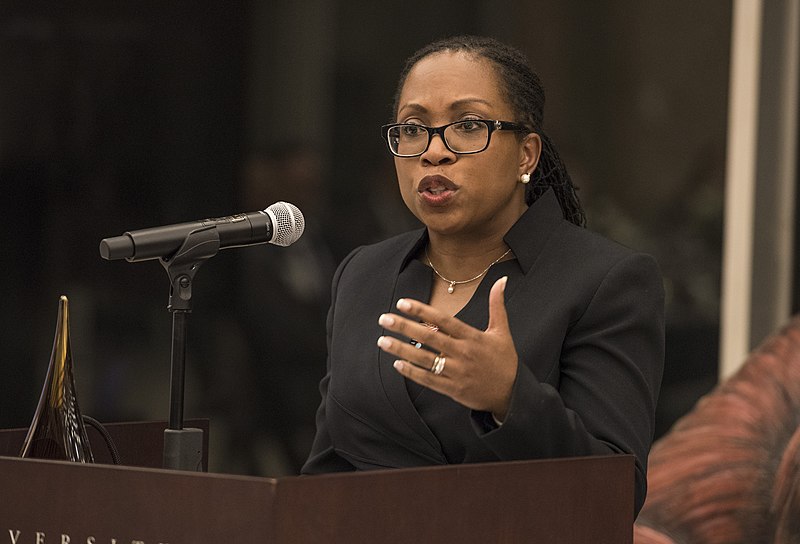Ketanji Brown Jackson: The First Black Female Supreme Court Justice
Justice Stephen G. Breyer’s retirement from the Supreme Court of the United States put into motion the historic confirmation process of Judge Ketanji Brown Jackson, the first Black woman justice in American history.
Wikicago, CC BY-SA 4.0
Judge Ketanji Brown Jackson, pictured, has been confirmed to the Supreme Court as the 116th Associate Justice as of April 7th, 2022.
Stephen G. Breyer’s retirement after serving 28 years as a Supreme Court Justice has allowed President Biden to fulfill his campaign promise of appointing the first Black woman to the Court in a historic move to increase representation in the national judiciary.
Justice Stephen G. Breyer
Justice Breyer, appointed by President Bill Clinton in 1994, has announced his retirement this coming summer, at the end of the court’s term. Breyer is well-admired for his pragmatism. While he may not have been among the most well-known or famous Justices to be appointed, he is respected for his nonpartisan stance on judicial decisions. Rather than directly aligning himself with either political party, Breyer has been known to make decisions based on the palpable consequences to the citizens. He has long characterized his judicial philosophy as led by consequences and thus has earned a reputation for straying from strict obedience of precedence or direct interpretations of the law.

Breyer’s retirement from the court has been praised by members of the Democratic Party as a timely decision. Chanel Richardson ’22 said, “Justice Breyer’s retirement is important to the balance of the Supreme Court. Although it’s sad to see him go, the Democratic Party lost a seat on the court after Justice Ginsburg’s death, so it’s important that we keep this seat by allowing a Democratic President to nominate a Justice.”
Breyer is appreciated for his role as a liberal but generally moderate figure in an otherwise heavily partisan court. His retirement during President Biden’s term allowed the president to nominate a Justice with a similar ideology. The nomination also had much importance in terms of improving the quality of representation on the Supreme Court as a whole – never in the history of the court has a Black woman been appointed, despite the fact that Black women comprise nearly 13% of the overall population in the United States.
The Nominees
During his campaign, President Biden vowed to appoint the first Black woman to the Supreme Court. He made clear that he intended to fulfill this when he initially addressed Justice Breyer’s retirement, stating, “The person I will nominate…will be the first Black woman ever nominated to the United States Supreme Court,” and adding that this nomination is “long overdue.”
During the early days of the nomination process, frontrunners emerged who were generally believed to be the most likely contenders to take over Justice Breyer’s seat on the bench. Although Ketanji Brown Jackson was officially nominated as of February 25th, 2022, the other main contenders included Leondra Kruger and J. Michelle Childs.
Leondra Kruger, a California Supreme Court Justice, worked as a clerk for the late Supreme Court Justice John Paul Stevens and thus earned firsthand experience with the court and its workload. During her time serving as a deputy solicitor general for the Obama Administration, she argued twelve cases in front of the Supreme Court and is well-liked among the Solicitor General’s office. Had she been nominated, Kruger would have served as the youngest Justice on the court.
J. Michelle Childs, a judge on South Carolina’s federal court, was seen as a strong contender due to her vast experience in the judicial system and her ties to Congressman James Clyburn. Childs would notably become the only Justice to have been educated at a public school, unlike the other judges, all of whom share Ivy League backgrounds. This background, which would serve to dismantle elitist criticisms of the Democratic Party while also connecting her more to the citizens, was seen as an advantage to the Democrats and to the court as a whole. Furthermore, Childs was backed by Congressman Clyburn, who is largely credited for President Biden’s victory in the South Carolina Democratic primary in 2020. Clyburn urged President Biden’s vow to nominate a Black woman and strongly advocated for Childs’ nomination upon the news of Justice Breyer’s retirement.
Other potential nominees included civil rights attorney Sherrilyn Ifill and former New York public defender Circuit Judge Eunice Lee. However, ultimately, Ketanji Brown Jackson was nominated.
Ketanji Brown Jackson
Judge Ketanji Brown Jackson, nominated by President Biden to become the 116th Associate Justice of the Supreme Court, was officially confirmed on April 7th, 2022.
Jackson began her career serving as a public defender for two and a half years. Upon taking the bench this summer (once Breyer retires), she is set to become the first federal public defender to join the court, as well as the first Justice since Thurgood Marshall to have a significant background in criminal defense. She is experienced in the various facets of judicial work as she has also worked as a law clerk and made contributions to U.S. federal sentencing policy. Jackson was confirmed into her current position as a federal appellate judge by the Senate in 2021. During this confirmation process, it was made known that many Republican senators view Jackson’s history with public defense as a liability rather than praiseworthy.

Unsurprisingly, Jackson’s nomination has been met with mixed reactions. Although many are glad to see a woman of such prestige and background be nominated to the court, others such as U.W. Clemon are less than thrilled. Clemon, the first Black person to serve as a federal judge in the state of Alabama, personally wrote to President Biden asking that Jackson not be considered for the position of Supreme Court Justice because of her judicial records. Clemon spoke out as a result of Jackson’s decision in a 2016 class-action lawsuit, in which she refused to approve a $22 million settlement arranged for thousands of Black workers who experienced racial discrimination by their employer, Lockheed Martin. Clemon asserted that Jackson’s decision made her unfit for the role of Supreme Court Justice. His letter to President Biden ultimately went unheeded, however, as Jackson was officially nominated a little over two weeks later.
Despite criticism, many are responding positively to Biden’s decision to nominate a Black woman. Kyi Lin Thar ’22 stated, “I think Biden’s decision was really timely and fitting. People of color as a whole are underrepresented in the federal government and positions of power, so the fact that he chose to correct this by nominating Ketanji Brown Jackson to the Supreme Court is really important to a lot of people.”
The Nomination Process
Following President Biden’s nomination, the focus shifted to the Senate, where the confirmation process officially began. Currently, the Senate is practically evenly split between the Democratic and Republican Party, thus putting into motion a very divided voting process. Although the hope was that Jackson would gain bipartisan support from the senators, her confirmation was ensured by the full support of the Democratic senators and only three Republican senators.
Jackson’s confirmation process was heavily controversial and faced significant opposition from the Republican Party, many of whom argued that President Biden’s decision to appoint a Black woman was biased and focused on demographics rather than fairly considering the nominee best suited for the position.
Republican senators called for a slow confirmation process, heavily criticizing the “far-left” nature of the nominees, while Democrats such as Senate Majority Leader Chuck Schumer did the opposite, citing Justice Amy Coney Barrett’s confirmation as precedent for a quick confirmation. In reality, the confirmation process lasted forty-one days after Jackson’s initial nomination — eleven days longer than Justice Barrett’s confirmation process.
During Jackson’s confirmation hearings, she was asked a plethora of questions by Democratic and Republican senators alike, ranging from questions on her career and qualifications to more broad, social topics outside of the range of judicial work such as critical race theory. While Jackson was undoubtedly questioned on legal matters such as her sentencing history in cases she presided over and Supreme Court cases such as Roe v. Wade, the more divisive questionings of Republican senators such as Ted Cruz and Marsha Blackburn arguably received more attention.
Senator Cruz of Texas asked Jackson at length about the implications of affirmative action, questioning whether he could simply decide he was Asian in order to benefit from the policies. Senator Blackburn of Tennessee asked Jackson, “Can you provide a definition for the word ‘woman’?” Jackson was criticized at length by various Republican senators for her supposed “inability” to answer such questions, feeding their beliefs that she was too liberal to effectively serve as a Justice.
However, regardless of criticisms, Jackson’s confirmation played out as anticipated as she received full party support and that of three Republican senators – Utah Senator Mitt Romney, Alaska Senator Lisa Murkowski, and Maine Senator Susan Collins.
As of Monday, April 4th, 2022, Jackson’s confirmation process reached the Senate Judiciary Committee, where it received a divisive 11-11 vote. The deadlock was broken by a full Senate vote called by Democratic Senate Majority Leader Chuck Schumer which yielded a 53-47 result in favor of Jackson, thus officially pushing her nomination through to its final vote. The final vote which commenced on Thursday, April 7th, 2022, received the same result, with each senator voting exactly as they did that past Monday.
Jackson will not officially join the Supreme Court until Justice Breyer retires this coming June or July. Though historic, Jackson’s confirmation will not have any large impact on the current ideology of the Supreme Court. The court currently comprises three liberal justices and six conservative justices. Jackson’s replacement of Justice Breyer will not add any numbers to either side, thus allowing the court to remain right-facing in its rulings. As a result, Jackson’s role on the court, although significant in terms of representation, will not change expectations in regard to rulings on major upcoming cases such as abortion and gun control.
“I think her [Jackson’s] history as a public defender makes her unique, especially since a lot of the Justices started as prosecutors. I’m excited to see how she applies her background to her decisions,” said Chanel Richardson ’22.
Mandeep Kaur is an Arts and Entertainment Editor for ‘The Science Survey.’ She finds journalistic writing to be greatly appealing for its ability to...











